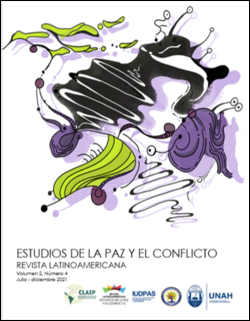Analysis of citizen security policies in El Salvador and their impact on the increase in violence
DOI:
https://doi.org/10.5377/rlpc.v2i4.11373Keywords:
Citizen security, gangs, maras, El Salvador, violence, public policiesAbstract
This article analyzes the citizen security policies that have been implemented in El
Salvador to combat gangs. The study reviews the four different governments that from
2003 to 2019 have tried, without success, to reduce the high levels of violence. The article
examines how these policies have allowed the strengthening of gangs, the weakening of
institutions and, mainly, the spike in violence and in homicides, which has made El
Salvador one of the most violent countries in the world. On the other hand, a brief
presentation is also made on the future of the citizen security policy of the government of
Nayib Bukele, considering the current context generated by the COVID-19 pandemic.
Downloads
7210
HTLM (Español (España)) 4345
XLM (Español (España)) 4789
EPUB (Español (España)) 144
Downloads
Published
How to Cite
Issue
Section
License
The journal's contents are published under a Creative Commons Attribution 4.0 license (CC BY 4.0). This license allows third parties to share (copy and redistribute the material in any medium or format) and adapt (remix, transform and create from the material for any purpose, including commercial), as long as the authorship and first publication in this journal (Revista Latinoamericana Estudios de la Paz y el Conflicto, Universidad Nacional Autónoma de Honduras - Consejo Latinoamericano de Investigación para la Paz, DOI of the work) is acknowledged, a link to the license is provided and it is indicated if changes have been made to the original. The terms of the license are available online at http://creativecommons.org.




